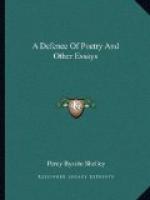Poetry turns all things to loveliness; it exalts the beauty of that which is most beautiful, and it adds beauty to that which is most deformed; it marries exultation and horror, grief and pleasure, eternity and change; it subdues to union under its light yoke, all irreconcilable things. It transmutes all that it touches, and every form moving within the radiance of its presence is changed by wondrous sympathy to an incarnation of the spirit which it breathes: its secret alchemy turns to potable gold the poisonous waters which flow from death through life; it strips the veil of familiarity from the world, and lays bare the naked and sleeping beauty, which is the spirit of its forms.
All things exist as they are perceived; at least in relation to the percipient. ’The mind is its own place, and of itself can make a heaven of hell, a hell of heaven.’ But poetry defeats the curse which binds us to be subjected to the accident of surrounding impressions. And whether it spreads its own figured curtain, or withdraws life’s dark veil from before the scene of things, it equally creates for us a being within our being. It makes us the inhabitants of a world to which the familiar world is a chaos. It reproduces the common universe of which we are portions and percipients, and it purges from our inward sight the film of familiarity which obscures from us the wonder of our being. It compels us to feel that which we perceive, and to imagine that which we know. It creates anew the universe, after it has been annihilated in our minds by the recurrence of impressions blunted by reiteration. It justifies the bold and true words of Tasso: Non merita nome di creatore, se non Iddio ed il Poeta.




